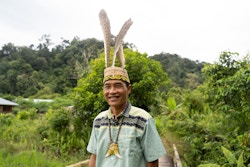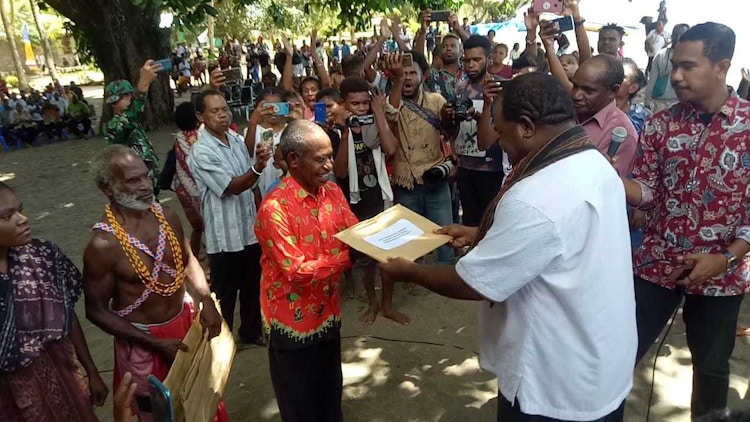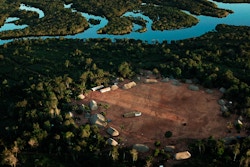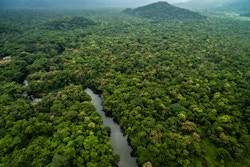
How we work on the ground
Protecting Indigenous and forest people’s land rights is at the core of our collaboration with our partner organizations in six rainforest countries.
INDIGENOUS: Three men from the Wajãpi people in the Brazilian Amazon making their way through the rainforest in 2008. Photo: Bo Mathisen
By Rainforest Foundation Norway.
There is overwhelming evidence that Indigenous peoples and local communities are the most effective guardians of tropical rainforests and their natural resources, particularly when their ancestral land rights are formally recognized.

Did you know?
- Forest areas managed by Indigenous and local communities are generally better preserved from deforestation than any other land category, including national parks. Source: nature.com
- Deforestation is two to three times lower in areas where Indigenous peoples have land rights. Source: maaproject.org
That is why one of our key goals is to secure land rights and strengthen civil society in six rainforest countries in South America, Central Africa and Southeast Asia.
We collaborate with over 60 local and national environmental, Indigenous and human rights organizations in Brazil, Peru, Colombia, The Democratic Republic of the Congo, Indonesia and Papua New Guinea.
Through almost four decades, we have developed unique access and trusting relationships with a diverse network of partners, many representing populations that are hard to reach.
We have built long-term partnerships with legitimate and representative organizations, aiming to enhance their capacity and effectiveness, and develop shared strategies.

VICTORY: A local community in Indonesian Papua receives official confirmation of the cancellation of a proposed palm oil plantation on their traditional rainforest lands in 2022. Rainforest Foundation Norway supported the local community in their struggle to save their rainforest. Photo: RFN
Our partners are key to our impact
Our partners are the most important source of first-hand information about what happens on the ground in the rainforest. The relationship with our partners is based on mutual respect, long-term commitment, decisiveness, and the exchange of knowledge and experiences.
This alliance is the key to our impact.

Together, we co-create projects to ensure:
- the rights of Indigenous peoples and forest communities to traditional lands
- freedom from prosecution
- the involvement of Indigenous people and local communities in decisions concerning them
- recognition of their knowledge and crucial role in biodiversity conservation and sustainable forest management

«The rainforest contributes to the climate of the entire world, and the only reason it still stands is that people live there; people who defend it with their lives. I expect respect and for those who defend the forest to be included in the discussions about how to preserve it.»
Juma Xipaia
One of 40 Indigenous leaders chosen to attend the COP26 climate summit in Brazil in 2023
Vastly underfunded
Despite growing recognition of the benefits of rights-based, local forest management, and recent increases in funding, Indigenous rights and forest management in tropical countries remain vastly under-invested – given the extent of unrecognized community claims to land and forests and the estimated costs to secure these rights.

Did you know?
At least a third of the carbon and biodiversity stored in tropical forests is located in community forests that still lack formal recognition.
A guarantor for efficient funding
Why support Rainforest Foundation Norway, rather than fund national organizations directly?
We have an almost four decades long history of funding and co-creating projects – ensuring that rainforest partners can spearhead the fight to protect their forests at the full scale of their capacities and through strong representative organizations. We take our partners' fight and advocacy efforts to national and international arenas where political decisions impacting rainforests are made.
By connecting partners, civil society networks within and across countries and continents, promoting knowledge sharing and learning exchanges, we bring innovative, tested solutions to the scale needed
We champion direct support towards our around 60 long-term partner organizations in six rainforest countries, and ensure that donor and investor funds are spent effectively and make an impact.






